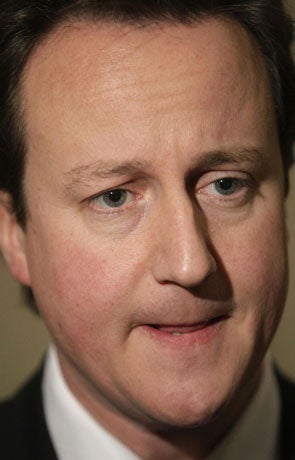'Drifting' Tories' see poll lead halved

Your support helps us to tell the story
From reproductive rights to climate change to Big Tech, The Independent is on the ground when the story is developing. Whether it's investigating the financials of Elon Musk's pro-Trump PAC or producing our latest documentary, 'The A Word', which shines a light on the American women fighting for reproductive rights, we know how important it is to parse out the facts from the messaging.
At such a critical moment in US history, we need reporters on the ground. Your donation allows us to keep sending journalists to speak to both sides of the story.
The Independent is trusted by Americans across the entire political spectrum. And unlike many other quality news outlets, we choose not to lock Americans out of our reporting and analysis with paywalls. We believe quality journalism should be available to everyone, paid for by those who can afford it.
Your support makes all the difference.The Conservative Party's lead over Labour has more than halved from nine to four points, according to the latest "poll of polls" compiled for The Independent.
The slump has stoked a heated debate among senior Tories about whether they should adopt bolder policies such as promising tax cuts in an attempt to build an election-winning lead over Labour.
Right-wingers claim the Tories are "drifting" because they have not followed up the inheritance tax cuts they announced last autumn, which helped them open a big poll lead.
According to the weighted average of the polls taken in January, the Tories are on 38 per cent (down three points on December), Labour 34 per cent (up two points) and the Liberal Democrats 18 per cent (up two points). If these figures were repeated at a general election, Labour would be the largest party with 300 seats but would be 26 seats short of an overall majority. The Tories would have 279 MPs, and would not be able to form a minority government with the Liberal Democrats, who would have 41 MPs.
John Curtice, professor of politics at Strathclyde University, who compiled the figures for The Independent, said they would be "a disappointment" for the Tories. "Instead of confirming that the party had at last clearly and consistently broken through the 40 per cent mark, it has slipped back below it once again," he said.
Every regular poll by Ipsos MORI, YouGov, Populus, ICM and ComRes recorded a fall on the Tories' pre-Christmas level of support last month.
The Tories are now at their lowest level since Gordon Brown scrapped plans for an autumn election.
While the figures will bring some relief to Labour, Professor Curtice believes Mr Brown has little cause to celebrate.
He said Labour was "still in the doldrums" and had not repaired the damage it suffered last autumn from the loss of child benefit records on 25 million people. David Cameron is under growing pressure from his own party to bring forward more policy announcements in the hope of forging ahead in the polls.
He is being portrayed as a cautious "tortoise" by more radical "hares" who want more initiatives – including firmer pledges on tax cuts for business and individuals. Right-wingers want the Tories to abandon their pledge to match Labour's spending totals, saying that would create room for tax cuts.
Grassroots pressure for a change of policy was shown in a survey of 1,600 party members for the Conservative Home.com website. Only 19 per cent supported matching Labour's plans, 45 per cent wanted £3bn of tax cuts and 32 per cent a lower planned rise in spending than Labour.
Philip Hammond, the shadow Chief Treasury Secretary, told the website that the party still believed in lower taxes and that its policy would create room for them over the economic cycle. He warned: "Our hard won credibility as a party would be put at risk if we were to lose our collective nerve and flip-flop on public spending policy at this critical moment."
But Mr Cameron's allies insisted the latest polling figures show that further work is required to improve the Tory brand.
"We are in a reassurance phase," one frontbencher said. "It's not the right time for fireworks."
They argued that promises to cut taxes would not be believed by voters.
Join our commenting forum
Join thought-provoking conversations, follow other Independent readers and see their replies
Comments